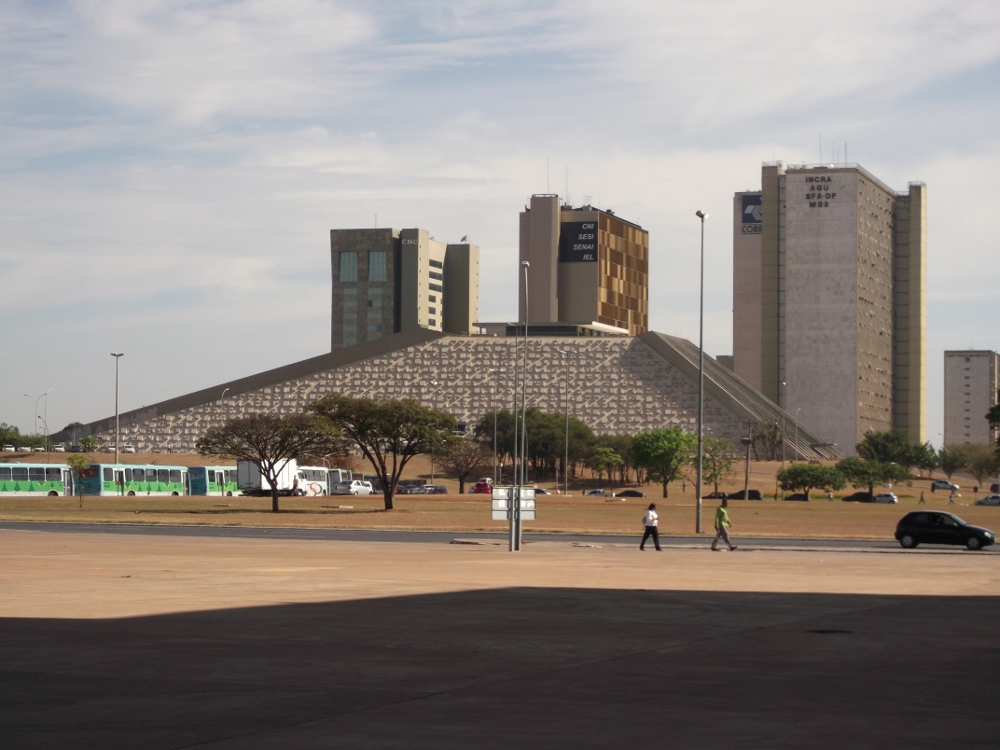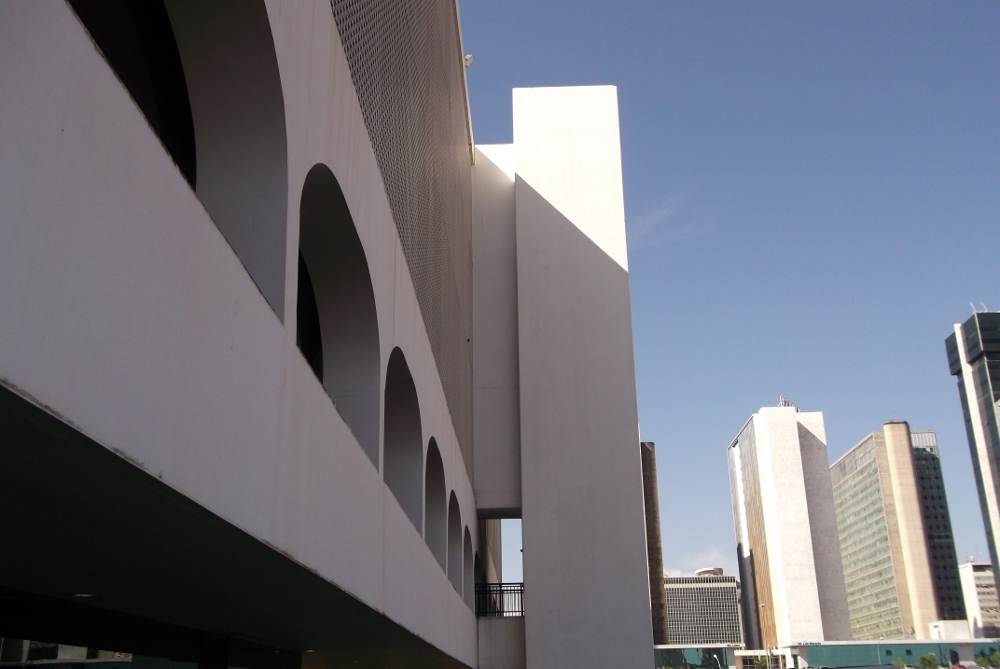theartsdesk in Brasilia: Music from the Melting Pot | reviews, news & interviews
theartsdesk in Brasilia: Music from the Melting Pot
theartsdesk in Brasilia: Music from the Melting Pot
This young capital city fuses the myriad cultures and influences of a sprawling nation
I know nothing about Brazil, I have come to realise. A Sergio Mendes album here, a Gilles Peterson compilation there, a blurred memory of catching City of God on Film4 once – these do not add up to even the beginnings of insight into a country big and diverse enough to be more like a continent in its own right.
That said, Brasilia itself does bring together a strange blend from across the sprawling nation. I'm in Brazil as part of a cultural delegation, meeting musicians, managers and promoters, and trying to help them understand how they might be able to reach out to European listeners and industry infrastructure. Practically every musician we talk to at some point mentions how Brasilia's unusual history – the capital city was built from scratch in the middle of wilderness and inaugurated as the capital 51 years ago – means that it brings together sounds from across the country.

In fact, in every way, Brasilia could hardly be more different to the chaotic hodgepodge of those cities. Its meticulous planning, strict boundaries and the elegant geometries of the Niemeyer architecture make it the antithesis of sprawling slums and tangled roads. In one way it was built to be deliberately inhuman, its open spaces and boulevards made wide open specifically to ensure that anti-government protests would always look small and insignificant – and indeed if you try and walk around the city (which nobody does), it's easy to feel like an ant among the giant blocks.
A mischievous-looking, gold-toothed old man, referred to by all as “The Master”, played a traditional bamboo flute as young women performed circus tricks
This kind of denial of ordinary human life is always illusory, though – and despite the scale and weird zoned make-up of the city, whereby you would see an entire city block of pharmacies and another of grocery stores, that life became quickly visible. Chatting to people in cafés, I generally found a laid-back mentality and an amount of pride in the city's culture – as opposed to its grandness – that surprised me. The grittier side of Brazilian life wasn't hidden either; just two blocks from the hotel district where we and oil-hungry American and Chinese businesspeople stayed was a precinct where crackheads seemed to dominate, and across the city policemen stood around on corners with the attitude of people who were very happy to be armed and would be very happy to draw their guns.
The laid-back attitude prevailed among the musicians, too, though, and their variety made me dizzy. I met Lucy & the Popsonics, a cheeky electro-punk-pop duo with a mordant sense of humour despite their zippy music. Pé de Cerrado were a sprawling band fusing Afro-Latin and native tribal percussion with an intense love of Gentle Giant and Jethro Tull, which altogether made for some overwhelming shamanic rock noise.

In amongst these were more straightforward rock and heavy-metal bands, traditional music originating from across Brazil and even a teenage security guard who made an unofficial approach to me demonstrating his rapping skills – doing extremely creditable impersonations of Ludacris and Busta Rhymes. Club promoters approached me too, eager to explain the local techno and dubstep scenes, and how they were putting on events to provide employment for marginalised people.
None of them could name a British music festival other than Glastonbury or Reading, but then I certainly couldn't name a Brazilian one other than Rock in Rio
This was a government-sponsored event but there was an odd informality to it too, as to everything in the Brasilia music scene that I witnessed. Almost nobody but the few biggest acts make a living from music in Brazil at all, with piracy rife and incomes generally low – but it still seems to be something that is considered honourable to pursue, and most of the musicians that I talked with demonstrated great patience and pleasure in what they did.
Possibilities are opening up, though. While the rest of the world economy tumbles in freefall, I felt a sense of optimism – Brazil has new oil reserves, its economy is growing and it is staging the World Cup and Olympics in 2014 and 2016 respectively. It's not India or China yet, but the world's eyes are on it, and the musicians were quietly aware of the possibilities that this affords if not necessarily how to exploit them internationally. Innovation internally is rife, with hyper-modern schemes like alternative currencies and crowd-funding helping recordings and shows to happen without outside investment – but few that I spoke to had detailed ideas of how they could break through into foreign markets.

As we left our hotel to move on we were confronted with a vast tour bus (pictured above, with Joe featured). The duo checking in to the hotel, we were told, played Brazilian country music – a monstrously cheesy sound all about the woes of life, performed at rodeos for the vast rural population, which is more popular by some degrees of magnitude than the country's more sophisticated, officially sanctioned cultural ambassadors like Caetano Veloso. Once again, I realise that despite what I've learned from my trip so far, I know nothing about Brazil.
As I write this, I have just arrived in Rio de Janeiro. Stepping out of baggage reclaim into the front concourse of Rio de Janeiro's aiport was a physical shock to the system. After the dry heat, clean lines, open spaces and considered attitudes of Brasilia it's a furious barrage of soupy humidity, shrieking police whistles, pungent smells, insistent hustlers, lights, car horns, clashing music and surging crowds. It really is another country entirely... and another story.
Explore topics
Share this article
The future of Arts Journalism
You can stop theartsdesk.com closing!
We urgently need financing to survive. Our fundraising drive has thus far raised £49,000 but we need to reach £100,000 or we will be forced to close. Please contribute here: https://gofund.me/c3f6033d
And if you can forward this information to anyone who might assist, we’d be grateful.

Subscribe to theartsdesk.com
Thank you for continuing to read our work on theartsdesk.com. For unlimited access to every article in its entirety, including our archive of more than 15,000 pieces, we're asking for £5 per month or £40 per year. We feel it's a very good deal, and hope you do too.
To take a subscription now simply click here.
And if you're looking for that extra gift for a friend or family member, why not treat them to a theartsdesk.com gift subscription?
more New music
 Cat Burns finds 'How to Be Human' but maybe not her own sound
A charming and distinctive voice stifled by generic production
Cat Burns finds 'How to Be Human' but maybe not her own sound
A charming and distinctive voice stifled by generic production
 Todd Rundgren, London Palladium review - bold, soul-inclined makeover charms and enthrals
The wizard confirms why he is a true star
Todd Rundgren, London Palladium review - bold, soul-inclined makeover charms and enthrals
The wizard confirms why he is a true star
 It’s back to the beginning for the latest Dylan Bootleg
Eight CDs encompass Dylan’s earliest recordings up to his first major-league concert
It’s back to the beginning for the latest Dylan Bootleg
Eight CDs encompass Dylan’s earliest recordings up to his first major-league concert
 Ireland's Hilary Woods casts a hypnotic spell with 'Night CRIÚ'
The former bassist of the grunge-leaning trio JJ72 embraces the spectral
Ireland's Hilary Woods casts a hypnotic spell with 'Night CRIÚ'
The former bassist of the grunge-leaning trio JJ72 embraces the spectral
 Lily Allen's 'West End Girl' offers a bloody, broken view into the wreckage of her marriage
Singer's return after seven years away from music is autofiction in the brutally raw
Lily Allen's 'West End Girl' offers a bloody, broken view into the wreckage of her marriage
Singer's return after seven years away from music is autofiction in the brutally raw
 Music Reissues Weekly: Joe Meek - A Curious Mind
How the maverick Sixties producer’s preoccupations influenced his creations
Music Reissues Weekly: Joe Meek - A Curious Mind
How the maverick Sixties producer’s preoccupations influenced his creations
 Pop Will Eat Itself, O2 Institute, Birmingham review - Poppies are back on patrol
PWEI hit home turf and blow the place up
Pop Will Eat Itself, O2 Institute, Birmingham review - Poppies are back on patrol
PWEI hit home turf and blow the place up
 'Fevereaten' sees gothic punk-metallers Witch Fever revel in atmospheric paganist raging
Second album from heavy-riffing quartet expands sonically on their debut
'Fevereaten' sees gothic punk-metallers Witch Fever revel in atmospheric paganist raging
Second album from heavy-riffing quartet expands sonically on their debut
 theartsdesk Q&A: Soft Cell
Upon the untimely passing of Dave Ball we revisit our September 2018 Soft Cell interview
theartsdesk Q&A: Soft Cell
Upon the untimely passing of Dave Ball we revisit our September 2018 Soft Cell interview
 Demi Lovato's ninth album, 'It's Not That Deep', goes for a frolic on the dancefloor
US pop icon's latest is full of unpretentious pop-club bangers
Demi Lovato's ninth album, 'It's Not That Deep', goes for a frolic on the dancefloor
US pop icon's latest is full of unpretentious pop-club bangers
 Yazmin Lacey confirms her place in a vital soul movement with 'Teal Dreams'
Intimacy and rich poetry on UK soul star's second LP
Yazmin Lacey confirms her place in a vital soul movement with 'Teal Dreams'
Intimacy and rich poetry on UK soul star's second LP
 Solar Eyes, Hare & Hounds, Birmingham review - local lads lay down some new tunes for a home crowd
Psychedelic indie dance music marinated in swirling dry ice
Solar Eyes, Hare & Hounds, Birmingham review - local lads lay down some new tunes for a home crowd
Psychedelic indie dance music marinated in swirling dry ice

Add comment